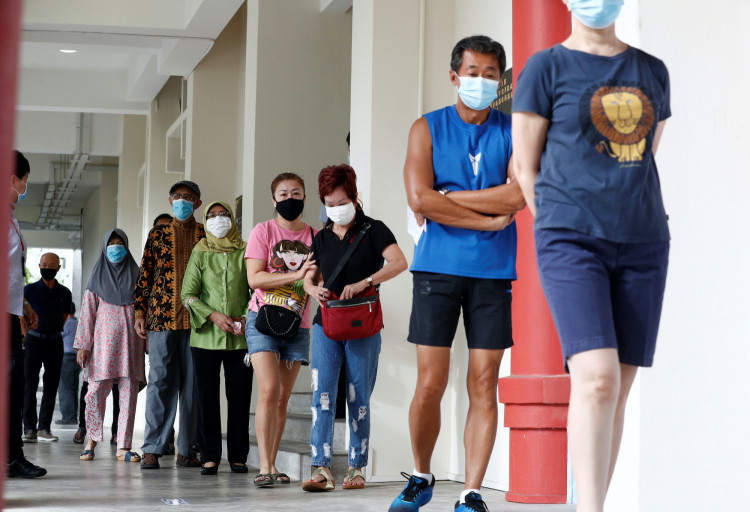SINGAPORE – Singaporean voters fretted over the risks of COVID-19 as they queued in masks to cast their ballots on Friday, amid an uptick in new infections and prospects of the city-state's economy entering its worst-ever recession.
In power since independence in 1965, the ruling People's Action Party (PAP) is widely expected by analysts to carry Prime Minister Lee Hsien Loong to another comfortable, and probably final victory.
Lee, the son of Singapore's founding leader Lee Kuan Yew, has held the premiership since 2004. Aged 68, Lee has already flagged his intention to step aside in coming years, but he wanted a fresh mandate to steer the country out of the coronavirus crisis.
As the prime minister queued up to cast his vote, a video widely shared on social media showed his wife tapping him on the shoulder to remind him to socially distance when he strayed too close to the person in front.
At polling stations round the city, election officials clad in face shields enforced distancing rules and took voters' temperatures as they entered polling booths.
"This is a very dangerous time to hold an election even though many precautions were taken," said Mayank Goel, 21, a biomedical engineering student after voting.
Some Singaporeans had voiced doubt whether it was worth risking going to polling stations, though voting is mandatory in on the small Southeast Asian island that has become wealthy by being a banking, trade and transport hub for the region.
Since easing its lockdown last month, the number of new daily cases in Singapore has crept back into double figures, excluding the migrant workers living in dormitories where infection rates have been far higher.
And opposition parties had criticised Lee for calling the election, warning that it could hit public health and distract from government efforts to tackle the virus.
Social distancing rules constrained campaigning, and there were no party rallies allowed.
QUICKER WITHOUT GLOVES
Singapore has one of the lowest COVID-19 fatality rates in the world and initially earned widespread praise for its efforts. But subsequent mass outbreaks in cramped migrant worker dormitories stained that early success, and persuaded the government to keep schools and businesses closed for longer.
Seen as a measure of approval for both the government's response to the coronavirus crisis and the next generation of leaders, the poll results will be closely watched as even small shifts in the PAP's popularity can lead to major policy changes.
When concerns around immigration and jobs flared in 2011, the PAP polled a record-low 60% of the vote and tightened international hiring rules to address voters' sensitivities.
Those concern have come to the fore again as the country emerges from lockdown to face its deepest recession.
Singapore is not the first country in Asia to hold elections during the pandemic - South Korea held parliamentary elections in April.
But with just 2.65 million voters in Singapore, election organisers counted on a fast, hygienic vote to minimise risks.
Voters were given a recommended time slot to vote. Inside the polling stations, they had to self-scan identity cards and sanitised their hands before receiving a ballot paper.
While officials had hoped it would take voters no more than five minutes to cast their ballot, some people said they waited for up to an hour as lines formed initially outside some polling stations.
Delays persuaded the election authority to drop a requirement for voters to wear gloves, and by around mid-morning the lines had receded.
Sample counts are expected soon after polling closes at 8 p.m. (1200 GMT) with final results due in the early hours of Saturday. A record 11 parties are contesting.
"Economy is not doing well so we need more voices and exchange of ideas (in parliament)," said entrepreneur Jay Phang, 60.





